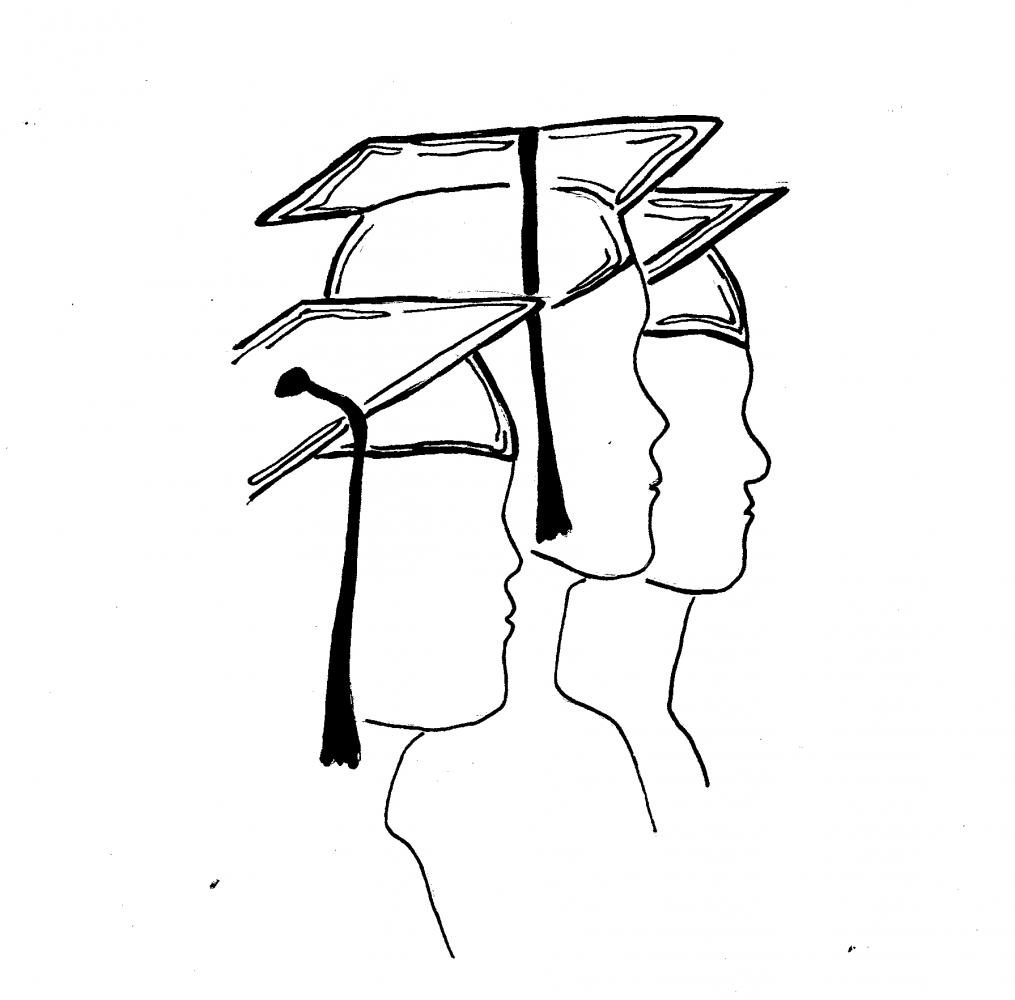Paths to Success
Different options after high school.
As the year comes to an end, Garfield’s senior class is rapidly approaching their graduation day. The end of their high school careers marks the beginning of a totally new life, which, for may students, involves college.
“About seventy percent of our twelfth grade students move on after graduation and matriculate directly into a four year college. We have another twenty percent that move onto two year colleges, so between two and four year programs we have about ninety percent of our twelfth grade students that are pursuing college after high school,” said head counselor Daniel Lee.
Although the majority of Garfield seniors enter a college program after graduation, that doesn’t mean that everyone chooses to. In fact, many students choose alternative options.
“The remaining ten percent is a mixture of students who haven’t met graduation requirements yet, and so they’re either finishing up their credits over summer or into the fall. There’s a small percent of students that join the military or will do a gap year and apply for colleges after that, or students that go directly to work or internships.”
Even when students have clear hopes of what they want to do in the early years of their career, social expectations may force people to consider options they aren’t interested in, or to ignore the paths they actually want to follow.
“I think there is a lot of pressure [to attend a four year college], especially at Garfield because it is a very academically competitive school. I think the culture at Garfield is a very college-going culture, since we offer so many Honors and AP (Advanced Placement) courses that are supposed to prepare you for college. I think the stigma of not going to a four year college is huge here at Garfield, and that can sometimes be a barrier for students because they feel like an internship or a trade school, for example like if you want to be an electrician, or a carpenter, or a plumber, things like that where you don’t necessarily need a four year degree,” said Lee, “They feel like that’s not as desirable here at Garfield for many reasons, and one of those reasons is that we do have a reputation for being a college-going school.”
College is certainly a legitimate goal, but that doesn’t mean it has to be seen as the only choice. Students will only thrive and learn successfully in the right environment for them, and so they should consider their options before deciding on a four year program.
“When students look around, they see success defined by entering a four year college, and I think that’s something the counselors could help with by really giving [other] options to students and explaining that you don’t need a four year college to get a good paying job,” said Lee. “If we push the message and fight the stigma against those other options, more students would be able to find the right place for them.”
The counseling department has high hopes for what they can do to help students recognize their options and learn more about different paths after high school.
“I’d really like to see the counseling department go into the direction of connecting students to internships or […] partnering with community members [in order to introduce students to different career paths].That’s something we haven’t done yet, but I think that will make the process more meaningful and help students really visualize what their post-high school life is going to look like.”
At this point in the year, many seniors are looking forward to their exciting new plans, while staff members look back and reminisce on their own final year of high school. A few of these stories have been shared with us here at the Messenger, and can be read to the right.
Hank Halfaker
I’m going to Northern Arizona University in Flagstaff next august. I decided to follow this path because I have always planned on going to college and this one checked all my boxes for a college. I don’t think Garfield necessarily helped lead me to my choice, I think I may have ended up at NAU regardless of where I went to high school. After next year I plan to continue going to NAU. After NAU I hope to come back to Seattle and get hired as a Seattle firefighter. Everyone has been pretty supportive of my plans. The only negative responses I’ve gotten has been on my choice of college. People seem to think NAU isn’t a prestigious enough college. I disagree with that and think you should pick a school based off what it offers you as an individual.
Daniel Lee
If I could talk to my high school self, I think the advice I would give is to do more research. I definitely didn’t do a lot of research, I didn’t meet with my school counselor, and I didn’t really do any learning on my own about colleges or careers. So a lot of that happened after the fact, I was already in college and then I had to really decide quickly what major I was going to choose, and then I switched my major. Everything felt like I was just reacting because I had to, and if I were to go back and give myself advice, I’d definitely say ‘hey, take some time, think about it, and plan it out. Talk to some people that are knowledgeable about the field that you want to go into and just really take more initiative,’ because I really never did take initiative, I didn’t plan. Plan it out and don’t be lazy, I was super lazy as a twelfth grade student and I think I paid the price a little bit after I graduated college because I was lost. I did different odd jobs, and I didn’t really find my way until I was like twenty eight, and that’s when I decided that I really wanted to make a change in my own life.
Masaki O’Malley
I’m going to be doing a gap year. I’m going to be practicing violin, and traveling to different places. I personally find it hard to deal with crazy amounts of stuff, so I decided that I should take another year and comfortably look at all the college audition pieces, and just focus on school and things that I have currently, instead of having to do all of that and looking at colleges, recording, and flying out to each college. It’s just way less confusing. My friends definitely lead me to this choice. A lot of my friends are musicians and have all started violin at at very young age. I started pretty late in the game, so I decided that I should really look at the colleges that I want to go to and focus on their requirements and really have time to practice. My experience at Garfield definitely has lead my choice in taking a gap year. Being in the orchestra has been great. After next year, hopefully I’ll be in college studying music.
Asante Seraile
After graduation, I’m going to be in an internship program called SYEP*, where we get thrown into a field of our liking and we get paid fifteen dollars an hour, and then in August I start a pitch program for a trade school. By December I’ll be working with a union. I chose to follow this path to make money right away. Being at Garfield, it’s very diverse and I’ve always liked working with people and around people. I could’ve gone to college, but I decided that for me the best choice was to go straight to the money.
*SYEP, The Seattle Youth Employment Program, “provides internship opportunities aimed at meeting the employment needs of underserved youth and young adults in our community. By promoting work readiness and strengthening career development, SYEP helps to prepare and support youth for real world jobs by providing them with the skills necessary to be competitive in the job market,” according to the program’s website.
Interested in learning more about different opportunities after high school? Check out these programs that offer alternatives to four year colleges and universities:
-Seattle Youth Employment Program:
https://www.seattle.gov/humanservices/services-and-programs/seattle-youth-employment-program
-Seattle Central College:
http://seattlecentral.edu/
-Seattle Vocational Institute:
http://svi.seattlecolleges.edu/
-The United States Military
https://www.military.com/join-armed-forces
Art by Ana Matsubara




